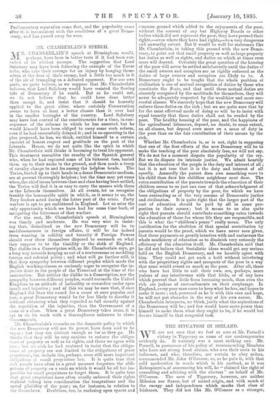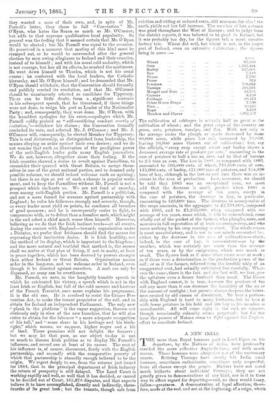THE SITUATION IN IRELAND.
WE are not sure that we feel so sore at Mr. Parnell's victory in Tipperary as some of our contemporaries evidently do. It certainly was a most striking one. Mr. Parnell, in pursuance of his policy of recommending Members who have not strong local claims, who owe their seats to his influence, and who, therefore, are certain to obey orders, recommended Mr. John O'Connor, or, as he puts it, with that cold moderation in words which is his method, as it was Robespierre's, of announcing his will, he " claimed the right of consulting and advising with the electors " on behalf of Mr. O'Connor. The men of Tipperary, however, are neither Milesian nor Saxon, but of mixed origin, and with much of the energy and independence which marks that class of Irishmen. They did not like Mr. O'Connor as a stranger,
they wanted a man of their own, and, in spite of Mr. Parnell's letter, they chose in full "Convention" Mr. O'Ryan, who hates the Saxon as much as Mr. O'Connor, bat adds to that supreme qualification local popularity. So general was the feeling that it seemed certain that Mr. O'Ryan would be elected ; but Mr. Parnell was equal to the occasion.
He perceived in a moment that mutiny of this kind must be stamped out, or he would be surrounded after the general election by men owing allegiance to Ireland and their counties, instead of to himself ; and with his usual cold audacity, which is not courage, but has all its effects, he crushed the mutineers. He went down himself to Thurles, which is not his usual coarse ; he conferred with the local leaders, the Catholic hierarchy, and Mr. O'Ryan himself ; and he demanded that Mr. O'Ryan should withdraw, that the Convention should formally and publicly rescind its resolution, and that Mr. O'Connor should be unanimously selected as candidate for Tipperary.
Th're can be little doubt, from a significant sentence in his subsequent speech, that he threatened, if these things were not done, to resign his post as Leader of the Nationalist
Party ; and, consequently, they were done. Mr. O'Ryan, with the humblest apologies for his error,—apologies which Mr. Parnell coldly praised as " self-sacrificing conduct worthy of incitation,"—withdrew his claims ; the Convention formally rescinded its vote, and selected Mr. J. O'Connor ; and Mr. J. O'Connor will, consequently, be elected Member for Tipperary. This is real dictatorship, as distinguished from leadership, the masses obeying an order against their own desires ; and we do not wonder that such an illustration of the prodigious power of the anti-English leader galls many English journalists. We do not, however, altogether share their feeling. If the Irish counties showed a desire to revolt against Parnellism, to reconsider their quarrel with Great Britain, to merge themselves in one of the great national parties, and to demand only possible reforms, we should indeed welcome such an uprising ; but there is no sign as yet of such a change in popular sentiment, and to keep the Parnellites without Mr. Parnell is not a prospect which enchants us. We are not fond of anarchy, even among anti-English parties. Mr. Parnell is a politician, and not a mere funnel for screams against partnership with England ; he rules his followers strongly and severely, though, as every leader must yield on points, he condones all breaches of good manners ; and he is consequently easier to fight, to compromise with, or to defeat than a formless mob, which might in the end select a chief much worse than himself. Moreover, believing as we do that the Irish instinct tends—at all events, during the contest with England—towards organisation under a Dictator, we prefer that Irishmen should find the means for expressing their instinctive desire. It is Irish hostility, not the method of its display, which is important to the kingdom ; and the more natural and truthful that method is, the sooner shall we arrive at that plan of living, if not in amity, at least in peace together, which has been decreed by powers stronger than either Ireland or Great Britain. Organisation means order in the long-run, and we welcome order in Ireland, even though it be directed against ourselves. A mob can only be dispersed, an army can be overthrown.
Mr. Parnell, we note, in the haughtily humble speech in which he celebrated his victory, a speech which is not in the least Irish or English, but full of the cold menace and hauteur of the French Terrorist, once more explains his programme. It is the old one. lie is resolved to resist the Crimes Prevention Act, to make the tenant proprietor of the soil, and to obtain for Ireland an independent Parliament. The only new plank in the platform " is the vague suggestion, thrown out obviously only in view of the new franchise, that he will also strive to obtain for the labourer " a more adequate recognition of his toil," and "some share in his heritage and his birthright," which means, we suppose, higher wages and a bit of land. Those promises will not delight the farmers ; but we may let that pass, as our object today is not so much to discuss Irish politics as to display Mr. Parnell's influence, and record one at least of its causes. The root of his influence is, of course, discontent, firstly with the English partnership, and secondly with the comparative poverty of which that partnership is absurdly enough believed to be the origin, We regret deeply to see, from the returns just issued for 1884, that in the principal department of Irish industry the return of prosperity is still delayed. The Land Court is working rapidly and well, so well that it has decided, or caused to be decided out of Court, 165,878 disputes, and that experts believe it to have accomplished, directly and indirectly, threefourths of its great task ; but the tenants, though safe from eviction and sitting at reduced rents, still murmur, for alas ! the earth yields not her full increase. The weather of last aatansn was good throughout the West of Europe ; and to judge from the district reports, it was believed to be good in Ireland. but it was probably too dry, for the figures tell a most unsatisfactory tale. Wheat did well, but wheat is not, in the larger part of Ireland, even an extensive cultivation ; the figures being in acres
The cultivation of cabbages is actually half as great as the cultivation of wheat ; and the great crops of the country are grass, oats, potatoes, turnips, and flax. Well, not only is the acreage under the plough or spade decreased by some 80,000 acres, while grass has only increased by 30,000, leaving 50,000 acres thrown out of cultivation ; but, say the officials, " every crop except wheat and. barley shows a decreased average rate of produce per acre," amounting in the case of potatoes to half a ton an acre, and in that of turnips to 2.5 tons an acre. The loss in 1884, as compared with 1883, amounted to 305,000 cwts. of wheat, 741,000 cwts. of oats, 145,000 carts. of barley, 411,000 tons of potatoes, and 114,000 tons of hay, although in the last-named case there was an increase in the area of production. Lest, moreover, we should be told that 1883 was an exceptional year, we must add that the decrease is much greater when 1884 is compared with the average of ten years, except in the case of potatoes, the decrease in hay, in particular, amounting to 123,000 tons. The decrease in money-value of the crops amounts, in the aggregate, to £2,734,000, compared with 1883, and to £1,233,000, when compared with the average of ten years, sums which, it will be remembered, come wholly out of the pocket of the farmer, who ploughs, sows, and manures in full expectation of at least an average crop, and who saves nothing by his crop running so short. The whole return is most unsatisfactory, and is not to our minds accounted for, either by the decrease in the area of cultivation—which, indeed, in the case of hay, is non-existent—or by the weather, which was certainly net worse than the average of ten years, or by the emigration, which was much as usual. The figures look as if some other cause were at work ; as if there were a deterioration in the productive power of the soil ; or as if the farmer, relieved from the terrible whip of an exaggerated rent, had actually cultivated less carefully. Whatever the cause,there is the fact, and the fact will, we fear, give the agitators even a firmer foothold than usual. The Union with England cannot, it is true, decrease the produce of the soil any more than it can decrease the humidity of the air or the amount of sunlight ; but poverty always deepens the bitterness created by old causes of discontent. To bear a partnership with England is hard to many Irishmen, but to bear it with fewer potatoes in his field and less hay in his meadow is unendurable. All will come right in the end, we suppose, though occasionally calamity seems perpetual ; but for the hour the powers of Nature seem to fight against the Eng,lish effort to conciliate Ireland.







































 Previous page
Previous page